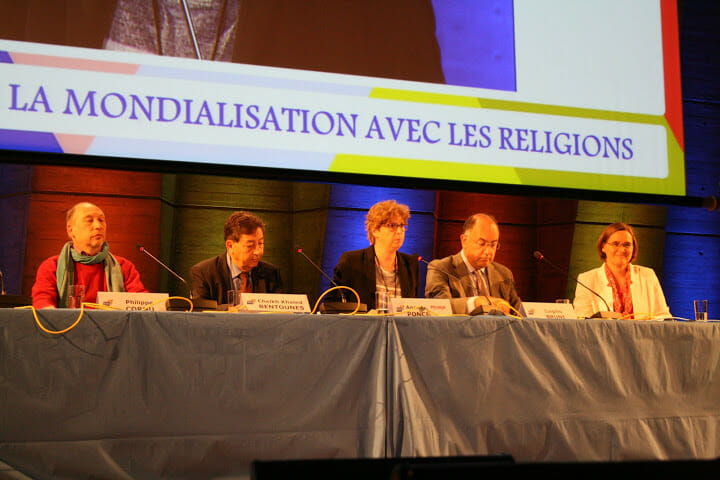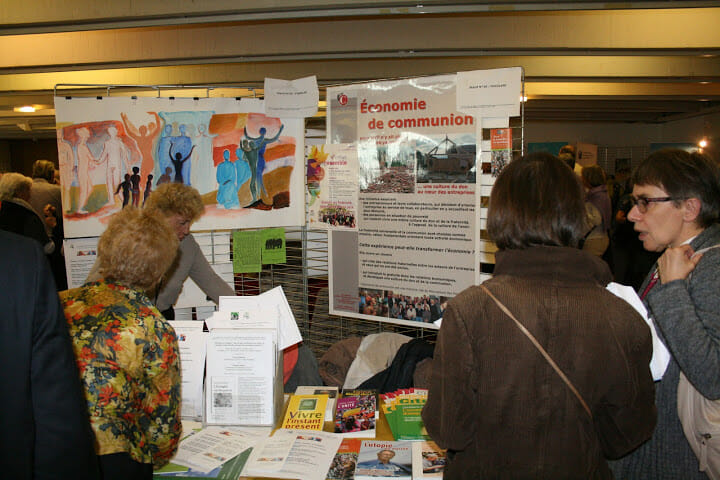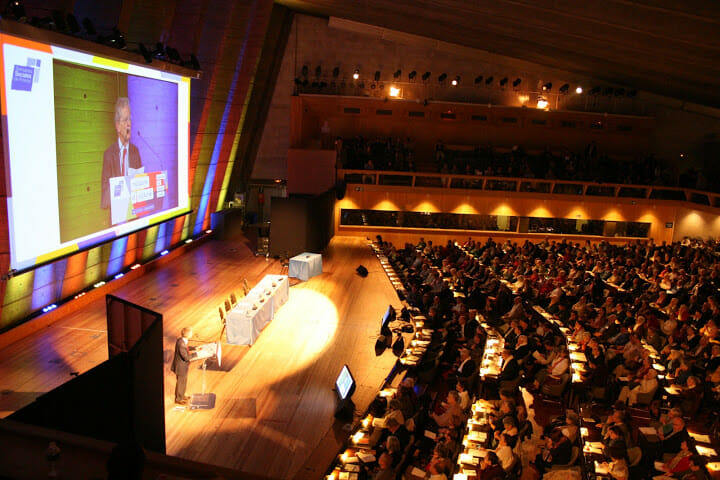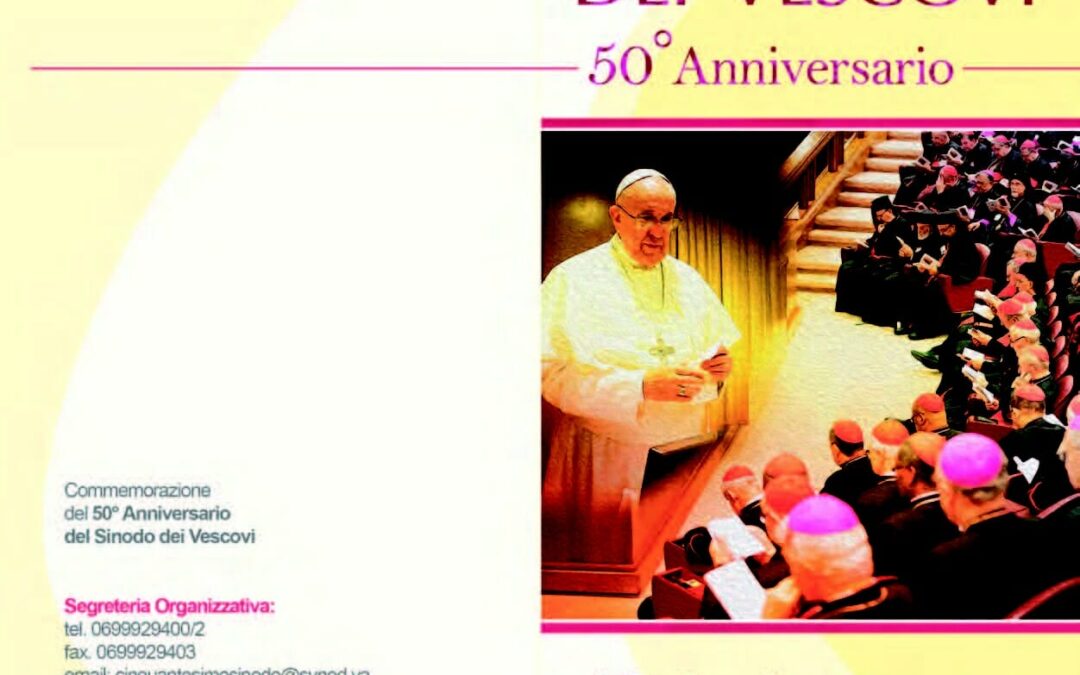
50th Anniversary of the Synod of Bishops
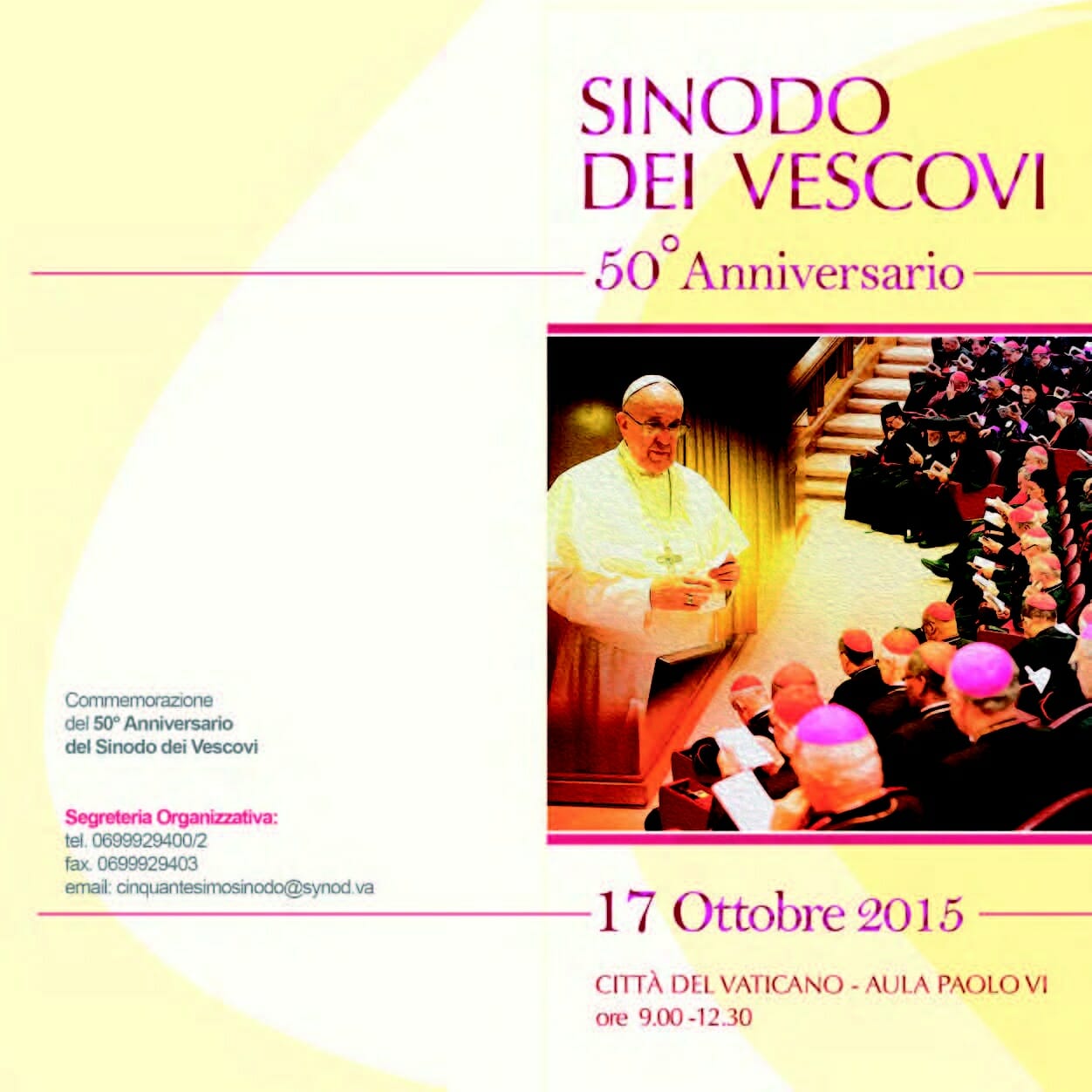 The Synod of Bishops is a permanent institution that was created by Paul VI on September 15, 1965, to keep alive the spirit of collegiality of the Second Vatican Council. This year marks the 50th anniversary of the institution, and the Catholic Church remembers it during the ordinary assembly of the Synod of Bishops, on “the vocation and mission of the family in the Church and in the contemporary world (October 5-25, 2015). On the morning of October 17, in the presence of Pope Francis, interventions will be given by Cardinal Lorenzo Baldisseri, General Secretary of the Synod of Bishops, and Cardinal Christoph Schönborn, President of the Bishops Conference of Austria. This will be followed by messages of bishops from the five continents, and the concluding address by the Holy Father. There is a large delegation from the Focolare amongst the invited guests, including Focolare president Maria Voce who described the Synod of Bishops as “one of the best fruits of the Second Vatican Council for a new sense of collegiality and deeper communion for the further building up of the Universal Church.” Synod comes from the Greek word “syn-hodos” which means “meeting” or “together”. The original meaning of the word, which is to “walk together”, expresses the essence of the Synod: a place for the bishops to encounter one another with the Pope, to share their thoughts and experiences in the common search for pastoral solutions that can be offered to the Church around the world.
The Synod of Bishops is a permanent institution that was created by Paul VI on September 15, 1965, to keep alive the spirit of collegiality of the Second Vatican Council. This year marks the 50th anniversary of the institution, and the Catholic Church remembers it during the ordinary assembly of the Synod of Bishops, on “the vocation and mission of the family in the Church and in the contemporary world (October 5-25, 2015). On the morning of October 17, in the presence of Pope Francis, interventions will be given by Cardinal Lorenzo Baldisseri, General Secretary of the Synod of Bishops, and Cardinal Christoph Schönborn, President of the Bishops Conference of Austria. This will be followed by messages of bishops from the five continents, and the concluding address by the Holy Father. There is a large delegation from the Focolare amongst the invited guests, including Focolare president Maria Voce who described the Synod of Bishops as “one of the best fruits of the Second Vatican Council for a new sense of collegiality and deeper communion for the further building up of the Universal Church.” Synod comes from the Greek word “syn-hodos” which means “meeting” or “together”. The original meaning of the word, which is to “walk together”, expresses the essence of the Synod: a place for the bishops to encounter one another with the Pope, to share their thoughts and experiences in the common search for pastoral solutions that can be offered to the Church around the world.
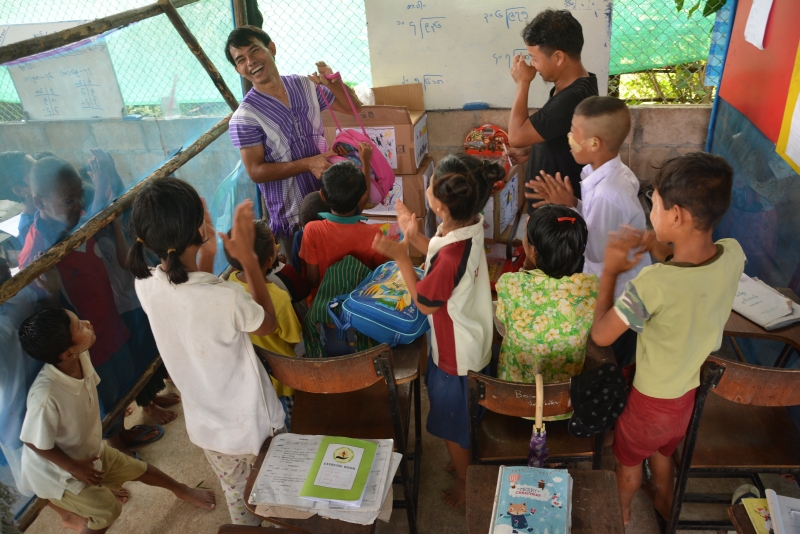
Thailand: A school has come to Mae-Sot
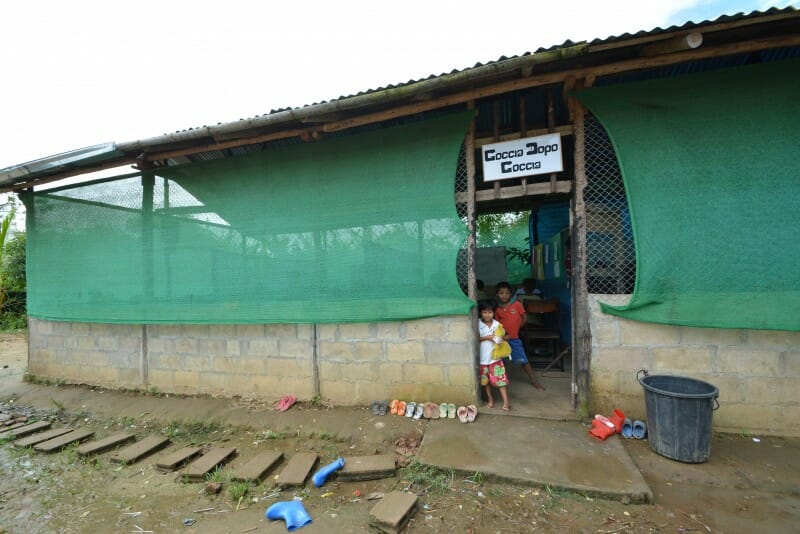 “It’s early morning, following a night of rain on the border between Thailand and Myanmar. Our breakfast consists of a hard-boiled egg and coffee. It’s the beginning of our adventure: four days in Mae Sot with a priest who works for refugees, the least of the least, the ones who don’t get into the official United Nations camps, the ones nobody cares for and who are often unpaid by those for whom they do a week’s work. They’re undocumented and don’ts have the power to protest, because nobody will defend them. Many of them have spent many years in the forests, and finally they can come out. Living amongst the walls and tunnels of factories and makeshift huts, it’s a miracle they’re still alive. Nobody talks about them, and nobody knows about their situation, but everyone knows that they’re worth their weight in gold, a low-cost work force of people ready to work for small salaries, just enough to live on. It’s why Mae-Sot will become such a special economic zone with many industries. We want to be here for at least a few of them. We’ve begun a project that helps the children in a school that didn’t exist too long ago, if not in the dreams of the children of Latina, Italy, and the refugee peers in Mae-Sot.
“It’s early morning, following a night of rain on the border between Thailand and Myanmar. Our breakfast consists of a hard-boiled egg and coffee. It’s the beginning of our adventure: four days in Mae Sot with a priest who works for refugees, the least of the least, the ones who don’t get into the official United Nations camps, the ones nobody cares for and who are often unpaid by those for whom they do a week’s work. They’re undocumented and don’ts have the power to protest, because nobody will defend them. Many of them have spent many years in the forests, and finally they can come out. Living amongst the walls and tunnels of factories and makeshift huts, it’s a miracle they’re still alive. Nobody talks about them, and nobody knows about their situation, but everyone knows that they’re worth their weight in gold, a low-cost work force of people ready to work for small salaries, just enough to live on. It’s why Mae-Sot will become such a special economic zone with many industries. We want to be here for at least a few of them. We’ve begun a project that helps the children in a school that didn’t exist too long ago, if not in the dreams of the children of Latina, Italy, and the refugee peers in Mae-Sot. 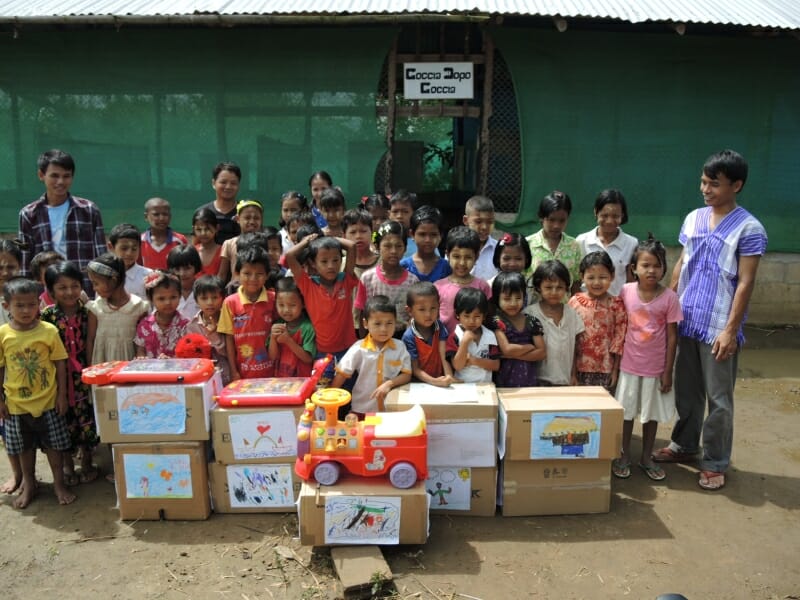 Now, the school does exist and it’s named is “Drop by Drop”. It’s an unlikely pairing between Latina and the mire of Mae-Sot: injustice, illness, rape, abuse, and so on. Some do well, and some thank God that they are still alive in the morning. . . and at night! Like one of the children at the school. I ask his mother: “What is your son’s name?” “Chit Yin Htoo,” she tells me. It means: “If you love me answer me.” “Did you give him the name when he was born?” I ask. “Maybe 3 or 4 years ago, maybe 5 or 6.” At this point I stop and am unable to go on writing. I can only pray that I don’t cry in front of this mother. How can this be? This project was a “loving folly“’ that only the mind of a child could dream up. And that’s what love is, it makes the desert flower, it spurs you to do the impossible, and it makes you glad! We adults follow these children with fear and trembling and respect, I would say: “Their angels gaze upon the Father in Heaven.” When I’m with “If you love me, answer me” I find it hard to make him smile. He’s shy and reserved. Only after much time am I able to take him in my arms: 6 years old, or perhaps 5. . . nobody is really sure . . . fragile and light as a feather. What have his small eyes seen? With a faint voice he’s just able to whisper a message. We distribute food, milk and especially puppets and toys: lanterns, then clothes that make everyone happy. “We don’t have enough for everyone, but let’s ask for a miracle,” I suggest. Let’s try to love one another and take care of each other as we do of ourselves.” Their eyes brighten when they see the football and football uniforms that have been given by a Football Academy of Priverno, Italy. So much love arrives, and the children are gladdened because they feel the love. It changes their sad eyes.
Now, the school does exist and it’s named is “Drop by Drop”. It’s an unlikely pairing between Latina and the mire of Mae-Sot: injustice, illness, rape, abuse, and so on. Some do well, and some thank God that they are still alive in the morning. . . and at night! Like one of the children at the school. I ask his mother: “What is your son’s name?” “Chit Yin Htoo,” she tells me. It means: “If you love me answer me.” “Did you give him the name when he was born?” I ask. “Maybe 3 or 4 years ago, maybe 5 or 6.” At this point I stop and am unable to go on writing. I can only pray that I don’t cry in front of this mother. How can this be? This project was a “loving folly“’ that only the mind of a child could dream up. And that’s what love is, it makes the desert flower, it spurs you to do the impossible, and it makes you glad! We adults follow these children with fear and trembling and respect, I would say: “Their angels gaze upon the Father in Heaven.” When I’m with “If you love me, answer me” I find it hard to make him smile. He’s shy and reserved. Only after much time am I able to take him in my arms: 6 years old, or perhaps 5. . . nobody is really sure . . . fragile and light as a feather. What have his small eyes seen? With a faint voice he’s just able to whisper a message. We distribute food, milk and especially puppets and toys: lanterns, then clothes that make everyone happy. “We don’t have enough for everyone, but let’s ask for a miracle,” I suggest. Let’s try to love one another and take care of each other as we do of ourselves.” Their eyes brighten when they see the football and football uniforms that have been given by a Football Academy of Priverno, Italy. So much love arrives, and the children are gladdened because they feel the love. It changes their sad eyes.  The school doesn’t have actual walls: slightly damaged blackboards. The teachers are volunteers who are only able to be paid a monthly salary of 50 €. Then there is the net and the toilets. . . I feel that I am inside a sanctuary of love, the kind of cathedral that Pope Francis would like. Years ago, I made a vow – that this would be my people and I would never abandon them. In front of this school, this “Drop of love” in the ocean of evil that surrounds us, I renew that vow.” Luigi Butori https://vimeo.com/140934325
The school doesn’t have actual walls: slightly damaged blackboards. The teachers are volunteers who are only able to be paid a monthly salary of 50 €. Then there is the net and the toilets. . . I feel that I am inside a sanctuary of love, the kind of cathedral that Pope Francis would like. Years ago, I made a vow – that this would be my people and I would never abandon them. In front of this school, this “Drop of love” in the ocean of evil that surrounds us, I renew that vow.” Luigi Butori https://vimeo.com/140934325
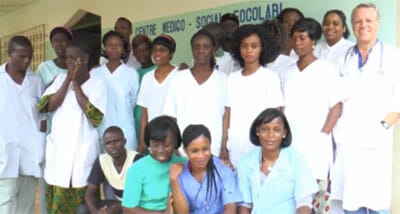
Ivory Coast: inauguration of the new Medical Centre in Man
 «During these years I think I alone visited 50,000 patients,» says Dr. A. Carlo Montaguti, a focolarino doctor and Director of the Social Medical Centre of the little Focolare town in Man, Ivory Coast. «I was a doctor in my country, Italy, but my practice was not so intense. Those who preceded me when there was still the war, told me before my departure: Carlo, if you don’t treat them, no one else will.» The patients arrived also in the night. The health records were compiled in the apatam (shed) in front of the hospital, and then they entered for the medical checkup by any of the three doctors of the centre, one of which is Muslim. The doctors prescribed the lab tests and got the results in about two hours. In a second visit, the diagnosis was done and the treatment prescribed. In the span of a morning one manages to get everything done. «It is not usual to have a lab for analysis in such a small centre in the suburbs,» Carlo continues; «I worked for four years without a lab and it was really difficult.» Luc Dro, head of the laboratory, explained that being in a tropical zone, there is great need for studies on parasites that cause malaria and other endemic diseases, but the lab is able to perform a complete check-up. The centre also has a small pharmacy, where over a 100,000 consultations were registered. «We do all that is possible to put the patients at the core of our work – says Dr. Alavo Bazini – and this explains the great influx. It does not suffice to say “the medicines are free of charge,” if the people are not satisfied. This is where the centre’s originality lies.» When possible, there is also a cultural mediator who translates into the local tongues. «We also have the internet and wi-fi connection – explained Dr. Eliassa Sow – In this way we can do research work and cooperate with other doctors from afar.» Dr. Montaguti continues «I came in 2004 – when the centre consisted of two tiny rooms for visits and one for medications. The people have appreciated our work especially because during the war in 2002, in the most difficult moments when all the foreigners were leaving the country, we decided to stay on, and risk our lives. They understood that we were there for them and this generated their trust. At times it came about that on a Monday, after the weekend break, the patients said: ”Doctor, I tried to endure in order to come to you.” If their situation was not too serious, they preferred to wait another day and suffer a bit more, to be able to come here!» One of the strong points of the centre is also the healthcare team which is involved in the entire care process. When the political-military crisis ended and the situation in the region calmed down, the term of the centre was extended and in 2008 we moved into a new facility. «It seemed like a dream – Carlo recalls – but after two years with the influx of patients – more than 80 a day plus their relatives – quite a crowd! – the old structure could not take any more. And we continued to dream.» And so last 10 October, the new Focolare Social Medical Centre, opened last 7 September, was inaugurated in Man, a stone’s throw from Mariapolis Victoria. It is a modern architecture for a facility of over 1,000 sq. m, with the addition of new services: 15 beds, a dentist’s studio, a physiotherapy room, and new diagnostics equipment (ultrasound scans, hemoglobin electrophoresis and microbiology). In the last days the nutrition centre, previously located in the district of Libreville, was completed and transferred to cure infantile malnutrition..
«During these years I think I alone visited 50,000 patients,» says Dr. A. Carlo Montaguti, a focolarino doctor and Director of the Social Medical Centre of the little Focolare town in Man, Ivory Coast. «I was a doctor in my country, Italy, but my practice was not so intense. Those who preceded me when there was still the war, told me before my departure: Carlo, if you don’t treat them, no one else will.» The patients arrived also in the night. The health records were compiled in the apatam (shed) in front of the hospital, and then they entered for the medical checkup by any of the three doctors of the centre, one of which is Muslim. The doctors prescribed the lab tests and got the results in about two hours. In a second visit, the diagnosis was done and the treatment prescribed. In the span of a morning one manages to get everything done. «It is not usual to have a lab for analysis in such a small centre in the suburbs,» Carlo continues; «I worked for four years without a lab and it was really difficult.» Luc Dro, head of the laboratory, explained that being in a tropical zone, there is great need for studies on parasites that cause malaria and other endemic diseases, but the lab is able to perform a complete check-up. The centre also has a small pharmacy, where over a 100,000 consultations were registered. «We do all that is possible to put the patients at the core of our work – says Dr. Alavo Bazini – and this explains the great influx. It does not suffice to say “the medicines are free of charge,” if the people are not satisfied. This is where the centre’s originality lies.» When possible, there is also a cultural mediator who translates into the local tongues. «We also have the internet and wi-fi connection – explained Dr. Eliassa Sow – In this way we can do research work and cooperate with other doctors from afar.» Dr. Montaguti continues «I came in 2004 – when the centre consisted of two tiny rooms for visits and one for medications. The people have appreciated our work especially because during the war in 2002, in the most difficult moments when all the foreigners were leaving the country, we decided to stay on, and risk our lives. They understood that we were there for them and this generated their trust. At times it came about that on a Monday, after the weekend break, the patients said: ”Doctor, I tried to endure in order to come to you.” If their situation was not too serious, they preferred to wait another day and suffer a bit more, to be able to come here!» One of the strong points of the centre is also the healthcare team which is involved in the entire care process. When the political-military crisis ended and the situation in the region calmed down, the term of the centre was extended and in 2008 we moved into a new facility. «It seemed like a dream – Carlo recalls – but after two years with the influx of patients – more than 80 a day plus their relatives – quite a crowd! – the old structure could not take any more. And we continued to dream.» And so last 10 October, the new Focolare Social Medical Centre, opened last 7 September, was inaugurated in Man, a stone’s throw from Mariapolis Victoria. It is a modern architecture for a facility of over 1,000 sq. m, with the addition of new services: 15 beds, a dentist’s studio, a physiotherapy room, and new diagnostics equipment (ultrasound scans, hemoglobin electrophoresis and microbiology). In the last days the nutrition centre, previously located in the district of Libreville, was completed and transferred to cure infantile malnutrition..
Video presentation of the Medical Centre (in French) https://vimeo.com/141902777
Chiara Lubich: Daring to dream of a new era
 “If one day all people, not as individuals but as nations, learn to put themselves aside, to put aside the idea they have about their own country, … and if they were to do this as the expression of the mutual love between States that God wants, just as he wants mutual love among individuals, that day will mark the beginning of a new era. For on that day, Jesus will be alive and present among peoples. … Now is the time for every people to go beyond its own borders, to look farther. Now is the time to love other countries as our own, to acquire a new purity of vision. To be Christians it is not enough to be detached from ourselves. The times we live in ask something more of the followers of Christ: the awareness of Christianity’s social dimension. … … We hope that the Lord may have mercy on this divided and confused world, on peoples closed within their own shells, contemplating their own beauty – so special to them – although it is limited and unsatisfying. With clenched teeth they hang on to their own treasures, those very treasures that could help other peoples, where many are dying of hunger. May the Lord cause the barriers to fall, and charity to flow unhindered between one land and another, in an endless stream of spiritual and material goods. Let us hope that the Lord brings about a new order in the world. Only he can make humanity one family and cultivate the distinctive characteristics of each people, so that the splendour of each, placed at the service of others, may shine with the one light of life. By making each earthly country beautiful, this light will make each one a foretaste of the eternal Country”. Chiara Lubich
“If one day all people, not as individuals but as nations, learn to put themselves aside, to put aside the idea they have about their own country, … and if they were to do this as the expression of the mutual love between States that God wants, just as he wants mutual love among individuals, that day will mark the beginning of a new era. For on that day, Jesus will be alive and present among peoples. … Now is the time for every people to go beyond its own borders, to look farther. Now is the time to love other countries as our own, to acquire a new purity of vision. To be Christians it is not enough to be detached from ourselves. The times we live in ask something more of the followers of Christ: the awareness of Christianity’s social dimension. … … We hope that the Lord may have mercy on this divided and confused world, on peoples closed within their own shells, contemplating their own beauty – so special to them – although it is limited and unsatisfying. With clenched teeth they hang on to their own treasures, those very treasures that could help other peoples, where many are dying of hunger. May the Lord cause the barriers to fall, and charity to flow unhindered between one land and another, in an endless stream of spiritual and material goods. Let us hope that the Lord brings about a new order in the world. Only he can make humanity one family and cultivate the distinctive characteristics of each people, so that the splendour of each, placed at the service of others, may shine with the one light of life. By making each earthly country beautiful, this light will make each one a foretaste of the eternal Country”. Chiara Lubich
Prayer for the Middle East and Africa
“Dear Synod Fathers, dear brothers and sisters, In resuming this morning the work of the General Congregation, I invite you to dedicate the prayer of the Third Hour to the intention of reconciliation and peace in the Middle East. We are painfully struck and we follow with great concern what is happening in Syria, in Iraq, in Jerusalem and the West Bank, where we see an escalation of violence that involves innocent civilians and continues to fuel a humanitarian crisis of enormous proportions. War brings destruction and multiplies the sufferings of peoples. Hope and progress come only from choices for peace. Let us unite, therefore, in an intense and confident prayer to the Lord, a prayer that intends to be an expression of solidarity at once with [our] brother Patriarchs and Bishops from those regions, who are present here [at the Synod Assembly], as well as with their priests and faithful, and to everyone who lives there. At the same time, together with the [whole] Synod, I send a heartfelt appeal to the international community, that the nations of the world might find a way effectively to help the parties concerned to broaden their horizons beyond the immediate interests and to use the instruments of international law [and] diplomacy, to resolve the conflicts underway at present. Finally, I wish to extend our prayer also to those areas of the African continent, which are experiencing analogous situations of conflict. May Mary, Queen of Peace and loving Mother of her children intercede for all”. (from Vatican Radio)
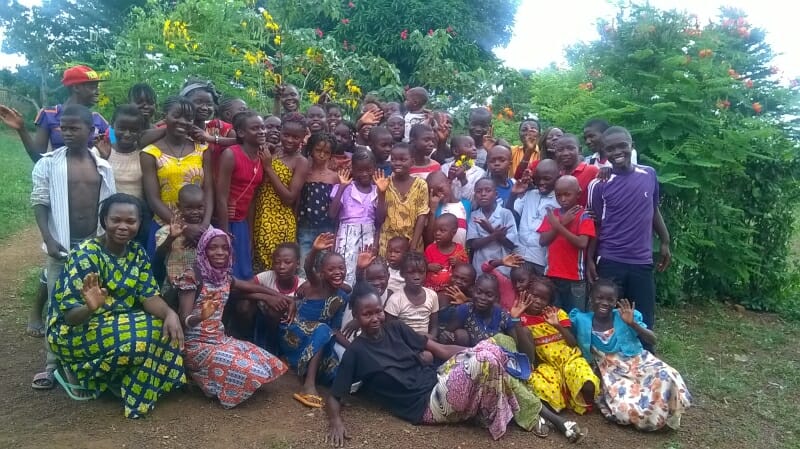
Hoping for peace in the Central African Republic
 It is difficult to know the numbers – Misna sources report 60 dead with 300 wounded – and describe the events in a country that has been sinking in political crisis since March 2013 when a group of rebels overthrew the president; and there have been further outbreak in recent days. “The socio-political situation has worsened,” writes Geneviève Sanzé from the Central African Republic. “Christian families live between the house and the forest, so that they won’t be discovered at home and lose their lives. One priest, who lives in the north where the situation is quite serious, is offering shelter to 12,000 refugees in his parish, who are taking refuge from projectiles that are being launched all around them. He doesn’t know how he will care and find food for them. There is no more adminstrative , political or military authority in the region, and there is the constant danger of bombs in crowded areas.” From the Focolare of Bangui they write: “We were preparing to do something concrete to help promote the peace that our country is so much in need of: a sport competition with mixed teams of Christians and Muslims; a march for reconcilliation comprised of all sorts of ethnic and religious groups; a concert by several musical groups, including our own to help sway public opinion towards the need for peace; continuing visits to refugees here in Bangui and in the prison. We invited our Muslim friends and friends from different Christian churches to take part in organising these and other events, and they enthusiastically accepted.” “The first event had been planned for the 26th of September, but was not held because of a massacre that taken place here in Bangui on that day,” recounts Berndadine who works at the Nunciature. “It all began with the discovery of the lifeless body of a young Muslim woman in a Christian area. But the murderer and the circumstances surrounding the death are still unknown. In the span of a few hours non-Muslim homes were attacked, and many people were killed.” Death is everywhere, looting, destruction of houses, churches, schools, offices of international organisations and many displaced persons, including several from the Focolare community. Some have lost close relatives. They write: “We encourage each other to love, each one of us wherever we are, ready to die for our own people. Pray with us, for us and for everyone living in similar situations.” The city has seemed dead for days. “You didn’t go to work,” wrote Bernardine. “The shops were closed, the only vehicles on the street were those of the United Nations and the French Military. The population organised a protest calling everyone to civil disobedience, demanding the restoration of the national military to protect the people. More people died during the manifestation and everything stopped. Things have improved a bit in recent days, we’ve resumed some of our activities, although schools are still closed. We’re in God’s hands and we always believe in His love. Sooner or later there will even be peace in the Central African Republic.” And this hope is supported by the upcoming visit of the Pope in late November. Fidelia, from the focolare in Bangui, recounts: “The entire population, regardless of ethnic or religious group, joyfully awaits his coming. You can feel it in the air, that the people are expecting him as the bearer of hope. Everyone is preparing spiritually and materially in order to be disposed to welcome the graces that Pope Francis’s visit will bring.”
It is difficult to know the numbers – Misna sources report 60 dead with 300 wounded – and describe the events in a country that has been sinking in political crisis since March 2013 when a group of rebels overthrew the president; and there have been further outbreak in recent days. “The socio-political situation has worsened,” writes Geneviève Sanzé from the Central African Republic. “Christian families live between the house and the forest, so that they won’t be discovered at home and lose their lives. One priest, who lives in the north where the situation is quite serious, is offering shelter to 12,000 refugees in his parish, who are taking refuge from projectiles that are being launched all around them. He doesn’t know how he will care and find food for them. There is no more adminstrative , political or military authority in the region, and there is the constant danger of bombs in crowded areas.” From the Focolare of Bangui they write: “We were preparing to do something concrete to help promote the peace that our country is so much in need of: a sport competition with mixed teams of Christians and Muslims; a march for reconcilliation comprised of all sorts of ethnic and religious groups; a concert by several musical groups, including our own to help sway public opinion towards the need for peace; continuing visits to refugees here in Bangui and in the prison. We invited our Muslim friends and friends from different Christian churches to take part in organising these and other events, and they enthusiastically accepted.” “The first event had been planned for the 26th of September, but was not held because of a massacre that taken place here in Bangui on that day,” recounts Berndadine who works at the Nunciature. “It all began with the discovery of the lifeless body of a young Muslim woman in a Christian area. But the murderer and the circumstances surrounding the death are still unknown. In the span of a few hours non-Muslim homes were attacked, and many people were killed.” Death is everywhere, looting, destruction of houses, churches, schools, offices of international organisations and many displaced persons, including several from the Focolare community. Some have lost close relatives. They write: “We encourage each other to love, each one of us wherever we are, ready to die for our own people. Pray with us, for us and for everyone living in similar situations.” The city has seemed dead for days. “You didn’t go to work,” wrote Bernardine. “The shops were closed, the only vehicles on the street were those of the United Nations and the French Military. The population organised a protest calling everyone to civil disobedience, demanding the restoration of the national military to protect the people. More people died during the manifestation and everything stopped. Things have improved a bit in recent days, we’ve resumed some of our activities, although schools are still closed. We’re in God’s hands and we always believe in His love. Sooner or later there will even be peace in the Central African Republic.” And this hope is supported by the upcoming visit of the Pope in late November. Fidelia, from the focolare in Bangui, recounts: “The entire population, regardless of ethnic or religious group, joyfully awaits his coming. You can feel it in the air, that the people are expecting him as the bearer of hope. Everyone is preparing spiritually and materially in order to be disposed to welcome the graces that Pope Francis’s visit will bring.”
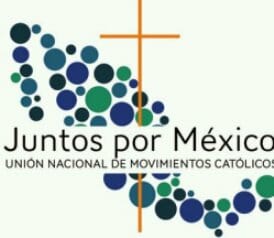
Together for Mexico
 JUNTOS POR MEXICO (Together for Mexico) is a venue for meetings and mutual respect in order to facilitate joint actions for the spiritual and social good of the country. The event will have a festive but also reflective nature, with formation and education dedicated to the whole family. More than 10,000 people are expected to attend, and will reflect on the theme of the family and the role of the lay person in society according to different perspectives: anthropological, spiritual, social, and political. One of the most anticipated and important topics is the vision of young people. On the list of international speakers are Dr. Giovanni Impagliazzo (Italy), Coordinator for Latin America of the Community of Sant’Egidio; Mr. Ricardo Sada L.C., the local director of Regnum Christi; Dr. Maria Consuelo Queremel, the Vice Minister General of the Secular Franciscan Order. Speaking for the Focolare Movement are the co-president, Dr. Jesús Morán (Spain) and spouses Anna and Alberto Friso (Italy), members of the Pontifical Council for the Family. Also present will be Margaret Karram (Israel) and Marc St-Hilaire (Canada), who are responsible for the dialogue with other ecclesial movements. The event will be transmitted in streaming at www.juntospormexico.org.mx
JUNTOS POR MEXICO (Together for Mexico) is a venue for meetings and mutual respect in order to facilitate joint actions for the spiritual and social good of the country. The event will have a festive but also reflective nature, with formation and education dedicated to the whole family. More than 10,000 people are expected to attend, and will reflect on the theme of the family and the role of the lay person in society according to different perspectives: anthropological, spiritual, social, and political. One of the most anticipated and important topics is the vision of young people. On the list of international speakers are Dr. Giovanni Impagliazzo (Italy), Coordinator for Latin America of the Community of Sant’Egidio; Mr. Ricardo Sada L.C., the local director of Regnum Christi; Dr. Maria Consuelo Queremel, the Vice Minister General of the Secular Franciscan Order. Speaking for the Focolare Movement are the co-president, Dr. Jesús Morán (Spain) and spouses Anna and Alberto Friso (Italy), members of the Pontifical Council for the Family. Also present will be Margaret Karram (Israel) and Marc St-Hilaire (Canada), who are responsible for the dialogue with other ecclesial movements. The event will be transmitted in streaming at www.juntospormexico.org.mx
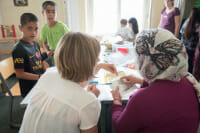
Germany: initiatives for the refugees
 Germany has repeatedly made it in the headlines due to its controversial policies regarding refugees, that stirred up a reaction of the people in welcoming the many migrants who have arrived. Also the Focolare Movement in Germany has been working for many years now for the integration of immigrants into the social context, and intensifying its welcoming initiatives in this period. Starting from the most basic needs – such as the collection of food, clothing, furniture and other basic items, German lessons and looking for medical or legal aid – to that of a man in Aschaffenburg, define “a counter attack.” In some cities there were also some violent episodes against the refugees and those who were helping them, but there was the firm decision to respond by giving a counter-testimonial, a message which came through forcefully. The Focolare of Dresda organized in this perspective, a soiree on the theme, “Love your neighbour as yourself.” One of the organizers said “we see how many live in anxiety or even fear: the soiree was very useful, and encouraged many people to undertake actions together.” In addition to this, there was also a social media campaign, #openyourborders and #signupforpeace, launched at international levels by the Youth for United World, together with the aim of giving a further boost to the initiatives of the United World Project. But there are also concrete examples of daily life, like that of a couple from Munich, Bayern. The evening before their departure for a weekend excursion outside the city, they received a phone call asking for their willingness to host for the weekend, a young Syrian mother with three small children, while waiting to continue her journey to Karlsruhe. Though they hoped that the four would leave soon so they could at least spend a part of the weekend in the mountains, the couple – despite their internal conflict – accepted; but “the moment we took the hand of our little five-year-old princess, the ice was immediately broken,” they wrote. The weekend with the unexpected guests passed with the games played with the children, sharing their breakfast where “we renounced hotdogs out of respect for our Muslim guests who highly appreciated the yoghurt and flatbread we bought for them,” and a Syrian supper prepared together. And when we had to say goodbye on Sunday morning, “we all had tears in our eyes, and were happy and mutually grateful” – wrote the couple. What a gift the Divine director of this unexpected programme had in store for us!” Read this on www.fokolar-bewegung.de Herberge gefunden! Flüchtlinge: Stärkeres Engagement gefragt
Germany has repeatedly made it in the headlines due to its controversial policies regarding refugees, that stirred up a reaction of the people in welcoming the many migrants who have arrived. Also the Focolare Movement in Germany has been working for many years now for the integration of immigrants into the social context, and intensifying its welcoming initiatives in this period. Starting from the most basic needs – such as the collection of food, clothing, furniture and other basic items, German lessons and looking for medical or legal aid – to that of a man in Aschaffenburg, define “a counter attack.” In some cities there were also some violent episodes against the refugees and those who were helping them, but there was the firm decision to respond by giving a counter-testimonial, a message which came through forcefully. The Focolare of Dresda organized in this perspective, a soiree on the theme, “Love your neighbour as yourself.” One of the organizers said “we see how many live in anxiety or even fear: the soiree was very useful, and encouraged many people to undertake actions together.” In addition to this, there was also a social media campaign, #openyourborders and #signupforpeace, launched at international levels by the Youth for United World, together with the aim of giving a further boost to the initiatives of the United World Project. But there are also concrete examples of daily life, like that of a couple from Munich, Bayern. The evening before their departure for a weekend excursion outside the city, they received a phone call asking for their willingness to host for the weekend, a young Syrian mother with three small children, while waiting to continue her journey to Karlsruhe. Though they hoped that the four would leave soon so they could at least spend a part of the weekend in the mountains, the couple – despite their internal conflict – accepted; but “the moment we took the hand of our little five-year-old princess, the ice was immediately broken,” they wrote. The weekend with the unexpected guests passed with the games played with the children, sharing their breakfast where “we renounced hotdogs out of respect for our Muslim guests who highly appreciated the yoghurt and flatbread we bought for them,” and a Syrian supper prepared together. And when we had to say goodbye on Sunday morning, “we all had tears in our eyes, and were happy and mutually grateful” – wrote the couple. What a gift the Divine director of this unexpected programme had in store for us!” Read this on www.fokolar-bewegung.de Herberge gefunden! Flüchtlinge: Stärkeres Engagement gefragt
